OCD Therapy
Quiet intrusive thoughts, ease compulsive patterns and reclaim peace of mind

Obsessive-Compulsive Disorder (OCD) is one of those mental health conditions that people sometimes joke about having. But just as feeling sad for a little while isn't the same thing as being depressed, what most people refer to as "being OCD" bears very little resemblance to the actual condition.
Living with OCD is more than just a minor inconvenience— people who suffer from OCD often feel trapped by their own thoughts and actions, and trying to make the obsessions and compulsions stop only seems to make it worse.
If you are one of the many individuals grappling with OCD, you can break free from the cycle of intrusive thoughts and compulsions and experience a positive shift in your daily life through effective counselling.
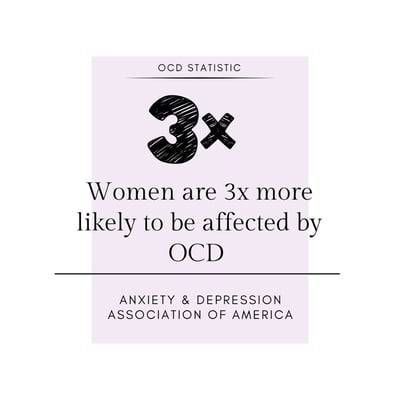
What is OCD?
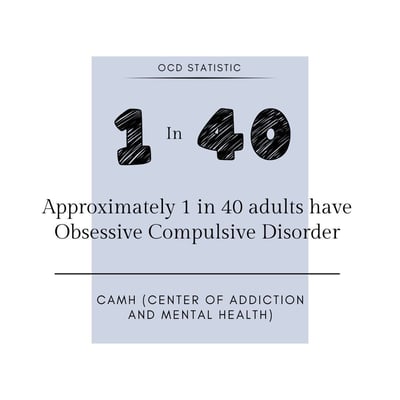
OCD is not just a casual term for perfectionism; it's a mental health condition that affects individuals on a profound level. OCD has been defined as "a disorder in which people have recurring, unwanted thoughts, ideas, or sensations (obsessions). To get rid of the thoughts, they feel driven to do something repetitively (compulsions)."
Often, people with OCD recognize that their thoughts are not realistic or even true. But that fact isn't enough to stop them from going through intense distress in response to them and feeling unable to stop themselves from their compulsive actions in response. Although the actions may provide a small amount of relief, it is typically short-lived
OCD can have far-reaching consequences beyond its immediate symptoms. Individuals dealing with OCD may experience heightened stress, anxiety, and a significant impact on their overall quality of life.
It's important to note that, in some cases, untreated OCD can contribute to the development of more severe disorders, including eating disorders, substance abuse issues, and even suicidal thoughts.
Recognizing OCD Symptoms
Am I showing signs of Obsessive Compulsive Disorder (OCD)?
Simply having upsetting thoughts or engaging in repetitive actions doesn't necessarily indicate OCD. According to the National Institute of Mental Health, It's normal to reconsider or double-check things on occasion.
Not every recurring thought qualifies as an obsession, and not all routines or habits fall into the category of compulsions. However, individuals with OCD typically exhibit the following characteristics

Lack of Control
Finding it challenging to control your obsessions or compulsions, even when acknowledging their excessive nature.
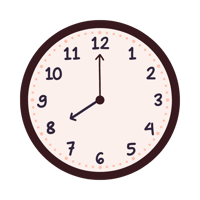
Time Investment
Spending more than one hour daily on obsessions or compulsions.

Absence of Pleasure
Not deriving any pleasure from compulsions but might experience temporary relief from associated anxiety.
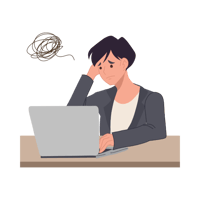
Impact on Daily Life
Significant disruptions in daily life due to these persistent thoughts or behaviours.
OCD can have far-reaching consequences beyond its immediate symptoms. Individuals dealing with OCD may experience heightened stress, anxiety, and a significant impact on their overall quality of life.
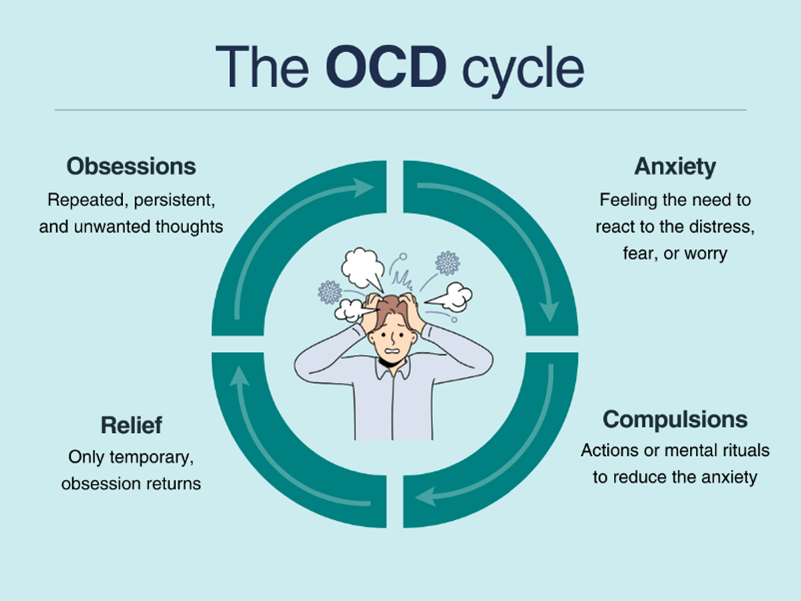
Lets us Help you Find the Right Match
Right Therapist, Right Plan, Real Support
The Role of Therapy in Managing OCD
Embarking on a journey to manage OCD involves understanding effective therapeutic approaches. Exposure and Response Prevention (ERP) therapy is considered the most effective psychotherapeutic treatment for Obsessive-Compulsive Disorder (OCD). By collaborating with a trained therapist, individuals can progress through carefully controlled exposures to challenging situations. The goal is to help clients live with these thoughts without distress or resorting to compulsive actions. Roughly 70% of people with OCD who receive treatment experience significant improvements in mood and functioning.
In addition to ERP therapy, The International OCD Foundation reports that medication, particularly selective serotonin reuptake inhibitors are widely recognized as effective. For more information about this option and if it’s right for you, please speak with a psychiatrist or other licensed medical professional who is knowledgeable about OCD.

Therapy may help manage the chaos of OCD into a journey of self-discovery and empowerment, guiding individuals toward reclaiming control and finding peace within their thoughts
In addition to ERP therapy, The International OCD Foundation reports that medication, particularly selective serotonin reuptake inhibitors (SSRI's) are widely recognized as effective.
For more information about this option and if it's right for you, please speak with a psychiatrist or other licensed medical professional who is knowledgeable about OCD.
Support Starts Here
OCD doesn’t have to control your life. With the right support, you can begin to break free and move toward the life you want
FAQs
Therapy works best when the 'fit' is right with your therapist. That’s why we carefully match you with someone whose expertise fits your needs and preferences. Building a strong therapeutic relationship is key to creating a supportive and effective experience.
Before meeting your therapist, you’ll complete a brief intake form. Your first 50‑minute session focuses on what brings you in, your goals, relevant history, and what success would look like. We’ll explain confidentiality and co‑create a plan so you know what comes next. It’s normal to feel nervous—your therapist will guide the pace.
The frequency of sessions depends on your needs and goals. Many people start with weekly or bi-weekly appointments and adjust as they make progress. The total number of sessions is unique to you—your therapist will work with you to find the right approach.
Living with OCD can feel exhausting and overwhelming, but effective, evidence-based therapies are available. Depending on your needs and goals, our therapists may use Cognitive Behavioural Therapy (CBT) with a focus on Exposure and Response Prevention (ERP), to help reduce compulsions and lessen the power of intrusive thoughts.
Other approaches, such as Acceptance and Commitment Therapy (ACT), may be used to build resilience by changing how you relate to intrusive thoughts, while Cognitive Therapy techniques can help challenge and reframe unhelpful beliefs that fuel OCD patterns. For some, Mindfulness-based strategies are also integrated to support calm, awareness, and non-judgment.
Each therapy is adapted to your unique situation, offering a safe and supportive space to gradually loosen OCD’s grip and move toward greater freedom, balance, and peace of mind.
Most of our services are covered by extended health benefit plans. Coverage varies with every plan, so please check your specific plan or contact your provider to confirm your benefits.
Most employer benefits cover therapy with a Registered Social Worker (MSW, RSW) or a Registered Psychotherapist (RP). We can direct bill to most major insurers when your plan allows it; otherwise, we email insurance‑ready receipts after your session.
Not sure yet? Let’s talk it through.
If you’d like to ask questions or explore your options first, book a free 20-minute matching consult or give us a call (226-752-8857) . One of our team members will help you find the right therapist and next steps that feel comfortable for you.
%20(1).png?width=200&height=80&name=Trillium%20Counselling%20Logo%20(999%20x%20398%20px)%20(1).png)

















